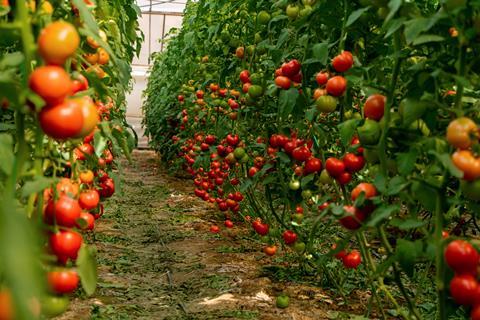Brexit border delays costing British tomato industry

Delays at the UK border are taking a “huge” toll on the British tomato industry, The Grocer understands.
Lengthy testing and release protocols are causing delays in the sowing and delivery of tomato plants to growers, with “dramatic financial implications”, warned Simon Conway, chair of the British Tomato Growers’ Association.
The association is now calling on government to introduce a fast-track process for tomato seeds and a plant health agreement with the EU.
Commercially grown UK tomatoes start life in nurseries – either raised from seed in the UK or raised in the Netherlands and brought over as young plants.
It is now taking up to six weeks to bring seeds into the country and deliver them to growers, said Conway. The delays are having “huge implications on crop viability as our growers only make profit in the last few weeks of the crop. Losing six weeks is hugely costly”, he warned.
Seed breeders are increasingly warning of the unviability of sending into the UK, the association said – compounded by testing requirements. The testing means a percentage of seed, costing around £2 each, is wasted.
The BTGA argued the said UK should instead have a plant health agreement with the EU, where the seeds are already cleared as disease-free before dispatch, as well as a fast-track process for tomato seeds.
It has also called on the government to reform the process to make it more streamlined and sustainable.
Read more: Brexit border strategy costs to hit £4.7bn amid delays and IT glitches
The Grocer understands some seed companies are telling growers to put in orders before the end of August for next year’s crop – far ahead of when growers agree programmes with retailers.
BTGA has issued a “plea for support” urging retailers to agree programmes with growers by the end of September.
The association also warned that those importing young plants into the UK may also soon face issue due to “constant delays” at the border.
The calls for border reform have been echoed by Nigel Jenney, chief executive of the Fresh Produce Consortium.
Calls for reform of the border have been echoed by Nigel Jenney, chief executive of the Fresh Produce Consortium. He told The Grocer that the current situation “reinforces the fundamental lack of understanding by the previous government” about how “fundamentally integrated” UK horticulture is with the rest of the world.
“We need to have a fundamental review of what is the most efficient and effective solution for industry and consumers that maintains our UK border biosecurity,” he added. “At the end of the day, the previous government lauded the strategy as a world-leading border, it’s not a world-leading border. It’s the world’s most inefficient and most expensive border.”
Leave a Reply Cancel reply
- Trending
- Comments
- Latest
Wells Fargo, Goldman Sachs, BlackRock Q4 earnings preview
Stocks making the biggest moves premarket: KBH, SIG, Teladoc, APLD
TTMiles
Travel with me and experience each trip as a magical chapter in my travelogues. Come along with me as we discover the marvels of the globe one engrossing tale at a time.
Read more
Categories
Recent News
Wells Fargo, Goldman Sachs, BlackRock Q4 earnings preview
© 2024 Trilliontravelmiles - The one stope travel news site by Trilliontravelmiles.















































